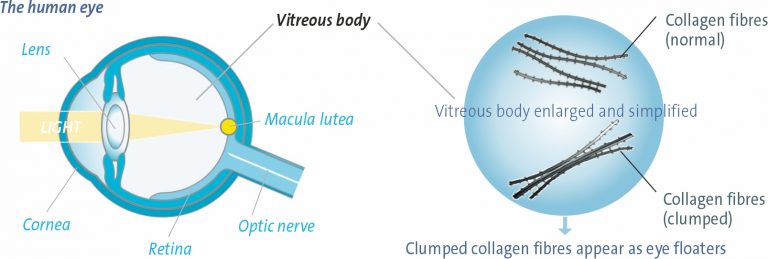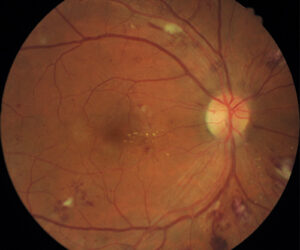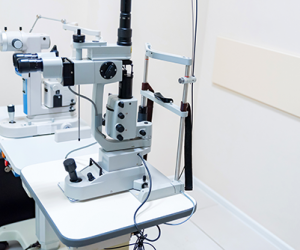Have you tried VitroCap® N?
VitroCap®N is designed to supplement your diet to help support the eye’s need for specific micronutrients. VitroCap®N food supplement is not a substitute for a varied and balanced diet and a healthy lifestyle!

Vitreous floaters are often described as black or grey specks, spots or strings in front of the eyes. Floaters in the eye cast a shadow on the retina and can appear to drift about when you move your eyes. If you move your eyes to focus on them you can find that they drift past out of the line of vision. They may be more noticeable in bright light surroundings or when looking at pale surfaces like white walls or snow.
This eye condition is also known as muscae volitantes (Latin for ‘hovering flies’) or myodesopsia (Greek). The nature of these black floaters means that some sufferers have mistaken them for flies appearing in the corner of their vision.
Eye floaters are a common occurrence that a large part of the population can experience at any point in their lives. While floaters in the eye don’t cause pain and are mostly harmless they can cause visual discomfort for some people impacted by them. Dealing with eye floaters can also cause a lot of stress to some individuals, impacting their quality of life.
In some cases, eye floaters can be a symptom of a serious condition. You should contact a doctor if you are concerned or notice any of the following:
In this case, the above symptoms may be the result of a retinal tear, a condition that requires immediate medical attention.
Floaters can arise from changes within the structure of the eye (primary eye floaters). The eyeball is filled with a clear, gel like substance called the vitreous body. It sits between the retina and lens helping to maintain the shape of the eyeball. Debris that emerges within the vitreous can cause a shadow to be cast upon the retina in the eye. This debris is what appears as the specks or dots in the line of vision.
There are several circumstances where eye floaters may appear. Typically they can develop as the result of the normal ageing process. However other external conditions or diseases can also produce secondary eye floaters.
Over time the structure of the vitreous in the eye can deteriorate. Continual exposure to factors such as environmental toxins and UV light can put stress on the eyes. These stressors are normally balanced out by antioxidants present in the eyes. However, if not enough antioxidants are available to combat these stressors then oxidative stress takes place. Evidence of increased oxidative stress has been found in cases of vitreous deterioration.
Collagen fibres within the vitreous structure are initially spread out loosely. These fibres can start to connect and clump together leaving gaps in this gel like structure. As a result, the vitreous can form pockets of liquid (called lacunae) in the vitreous. As the vitreous forms these liquid pockets it can shrink and pull away from the interior surface of the eye. This is referred to as Posterior Vitreous Detachment (PVD). This age related process can interfere with light passing through to the retina adding to the appearance of floaters.

In some cases of PVD, the vitreous can pull away with too much force from the retina which can cause it to tear. The sudden appearance of more eye floaters, flashes of light in the eye or loss of vision at the side of the eyes can be signs of a retinal tear. It is important to consult an ophthalmologist, if left untreated this can cause lasting vision loss in the eye.
Inflammation inside the eye (known as uveitis) has several causes including infection or due to autoimmune disease. As well as symptoms like blurry vision, eye pain and sensitivity to light it can also cause eye floaters. Eye inflammation can result in debris in the eye causing these floaters.
Myopia also commonly known as short sightedness, is a visual condition. The eye can focus on objects that are close but has trouble focusing on distant objects. This can be a risk factor for the onset of floaters.
Bleeding into the vitreous cavity can occur due to various conditions such as diabetes or sickle cell anaemia or due to injuries to the eye. Blood cells in the eye can appear as floaters.

Right eye retina of a patient with diabetic retinopathy
Injections from eye surgery or treatments can introduce bubbles into the eye which can also create the appearance of floaters.
Asteroid hyalosis results in calcium-lipid structures being spread out in the vitreous body, appearing as floaters.
There are multiple factors that can contribute to an individual experiencing either primary or secondary eye floaters. These include:
In most cases, eye floaters become less noticeable but don’t necessarily go away completely. The floaters may also settle out of the line of vision over time. In extreme cases where eye floaters are having a significant impact on the individual, surgery can be performed.
Surgery may be performed in rare but significant cases where floaters are persistent and impact the quality of life. Two current surgical procedures are:
The vitreous in the eye is removed and replaced with a salt solution to help the eyeball maintain its shape. Small self healing incisions are made to remove the vitreous and the amount removed can vary by case. This method usually reports a high success rate for the removal of floaters. However, it’s still possible to develop new floaters after surgery. There is also a risk of other complications such as the development of cataracts.
A laser (Nd: YAG laser) is used to target floaters to break them up. This may require several sessions of treatment. The success rates can be varied based on the case and while complications are minimal there are still risks.

Modern opthalmological laser used for eye surgery
As we have seen there are many reasons for the onset of eye floaters, it’s important to seek medical advice before beginning treatments. However, there are several actions you can take to support your overall eye health, which may also lessen the burden of eye floaters. Combatting the effect of everyday stressors on your eyes can require a commitment to several lifestyle changes. The following are some options to try:
It’s difficult to avoid screens especially when your job requires the use of computers. However, it’s important to find ways of reducing screen time or even taking small breaks. Adjusting your screen settings may also help reduce eye fatigue, some screens now have eye saver settings to help reduce eye strain.
Wearing sunglasses when outside in the sun can also help protect your eyes from the effects of UV light exposure which can impact your eye health.
Getting enough sleep is important not just for overall health but to give your eyes a chance to recover from the strains and stresses of the day.
There isn’t a specific eye floaters diet but eating anti-inflammatory foods such as tomatoes and dark leafy greens can help to support your eye health as well as overall health.
To support your diet you can also supplement it with certain micronutrients that support eye health. Nutrients such as Zinc and vitamin C may help guard against oxidative stress. Zinc is also involved in the metabolism of vitamin A which is another nutrient essential for eye health. L-lysine is an essential amino acid that the body does not produce and certain phytochemicals have been shown to have an impact on the collagen fibres that can appear as floaters.
VitroCap®N is designed to supplement your diet to help support the eye’s need for specific micronutrients. VitroCap®N food supplement is not a substitute for a varied and balanced diet and a healthy lifestyle!